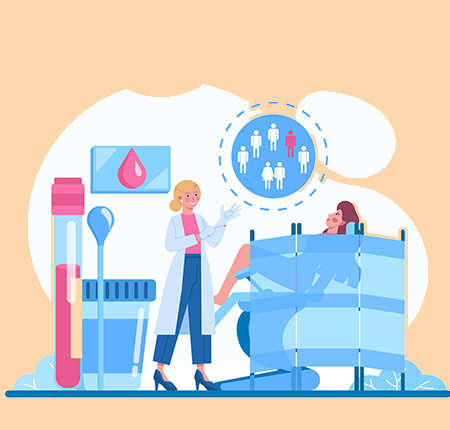
Genital herpes: causes, symptoms and methods of prevention
Genital herpes is a sexually transmitted infection (STI) that is transmitted through vaginal, anal and oral sex.
What is genital herpes?
Because it is one of the most common sexually transmitted diseases, it happens that infected people do not know that they have this condition. Genital herpes is one of the most common sexually transmitted diseases, but often, the infected person does not know that he is suffering of this disease.
As a rule, symptoms may not appear or go unnoticed. And currently, studies show that more than 400 million people in the world (11% of the global population) between the ages of 14 and 49 are infected with the virus that causes genital herpes.

Who can face genital herpes?
Anyone can get infected with the virus that causes genital herpes, but it is important to know that you will not get an infection if you share swimming pools, bedding or towels with a person who has genital herpes, because this virus does NOT survive in the external environment. It is therefore very unlikely that you will become infected by contact with an object or surface.
How is genital herpes transmitted?
Instead, genital herpes is transmitted as a result of vaginal, anal or oral sexual contact with an infected person.
In addition, genital herpes is also transmitted by:
injury
Saliva of an infected person
The secretions and genital area of an infected person
Infected blood
Syringes shared with someone who has genital herpes
The main symptoms of genital herpes
Most people infected with genital herpes do not know they have the disease because they have no signs or symptoms – or they are mild. 
When present, symptoms may begin about two to 12 days after exposure to the virus. If you have symptoms of genital herpes, they may include:
- Pain or itching, also sensitivity in the genital area throughout the infection.
- Small red bumps or small white blisters that appear a few days to a few weeks after infection.
- Ulcers. They can form when blisters break and ooze or bleed. Ulcers can make urination painful.
- Crust. The skin will crust and form scabs as the ulcers heal.
During an initial outbreak, symptoms may be flu-like, such as swollen lymph nodes in the groin, headache, muscle aches, and fever.
It is important to know that wounds appear when the infection has already entered the body and can manifest in the following areas:
buttocks
THIGH
anus
mouth
vaginal area
external genitalia
penis
scrotum
Causes of genital herpes
The cause of genital herpes is usually the transmission of infection with the herpes simplex virus II - HSV II, through sexual contact. In rare cases, genital herpes can be transmitted orally. The virus enters the body through mucous membranes or skin lesions.
Furthermore, women are much more prone to genital herpes infection because the risk of male-to-female transmission is greater.
Another possibility of transmission is from mother to child, when a woman has genital herpes and gives birth. It is essential to see a doctor early in pregnancy to reduce and eliminate any risks.
Risk factors for genital herpes
Because there are several risk factors in the occurrence of genital herpes infection, including: 
Unprotected sex
Increased number of sexual partners
HIV infection
Sexually transmitted diseases in the past
Oral-genital contact
Treatment of genital herpes
In the case of genital herpes, the treatment consists in the administration of antiviral drugs, to speed up healing in the acute phase. But you have to remember that the virus will remain in the body for life. In addition to medicines, you can also use patches that are applied to the genital area and ointments to treat lesions.
Basic treatment contains non-steroidal anti-inflammatory drugs and anti-algesics to reduce pain and inflammation.
Complications of genital herpes
When left untreated, genital herpes can cause complications, so it's very important to get your tests up to date and see a doctor when the first signs appear.
Infection with other sexually transmitted diseases
Genital herpes can facilitate the transmission of other sexually transmitted diseases and other viruses, including HIV. Because in the acute state of infection, when there are already lesions in the genital area, these lesions allow other viruses to enter the body, much easier than if there were none.
Neonatal herpes
One of the common complications occurs in pregnant women, as mentioned above. So, if the mother-to-be has the infection before becoming pregnant, the risk of the fetus having genital herpes is reduced. But if the infection is transmitted during birth, the baby's life can be put in danger.
If you are experiencing symptoms of genital herpes during pregnancy, it is vital to see a doctor for risk reduction treatment!
The spread of the infection in other areas of the body
If your immune system is weakened, there is a risk that the infection will spread to other areas outside of the genital area. How is that possible? If you are infected and have genital herpes lesions, you touch your eyes without washing your hands after having contact with the sores, there is a possibility of transmitting your infection to the eye area.
Diagnosis of genital herpes
For the diagnosis of genital herpes infection, you will need to consult a specialist doctor. He will need your sexual history and may recommend testing some samples from the lesion. It is a test that is only done if you have blisters or sores. This test, however, does not determine the date you were infected, nor from where the virus was contacted. But it is important that you recommend your sexual partners to get tested in turn.
How can genital herpes be kept under control
Unfortunately, there is no treatment that eliminates the virus from the body. The virus therefore stays in your body for the rest of your life.
However, you can do treatments to prevent complications and the spread of the infection, and for that, there are different medications that you can take for a short period of time and treatments to avoid passing the disease on to your partner.
In addition, you can strengthen your immune system and improve your hygiene in the genital area - and it is important not to let toxins and chemicals enter the body, which can cause allergies, irritations or infections. So always make sure you only use 100% organic cotton menstrual products.
Ways to prevent genital herpes
Suggestions for preventing genital herpes are the same as for preventing other sexually transmitted infections: First, limit sexual contact to one person who is not infected. But it is recommended to:
- Use or ask your partner to use a condom during every sexual intercourse
- Avoid intercourse if either partner has an outbreak of herpes in the genital area or elsewhere
How is the sexual life of a person infected with genital herpes affected?
Any sexually transmitted infection or disease can affect your life once you contract a virus. Especially since there is no definitive treatment and when you are affected you need to take care of your long-term health, protection and keeping genital herpes under control and not passing it on.
This does not mean that you can no longer have an active sex life, but you will need to inform your future partners about your situation. And because many times, infected people do not know that they have this virus - it can be without symptoms - it is extremely important to respect all protective measures and get tested periodically. This is because, even if you have no symptoms, the genital herpes infection can be transmitted even before the lesions appear, or after they have disappeared.























